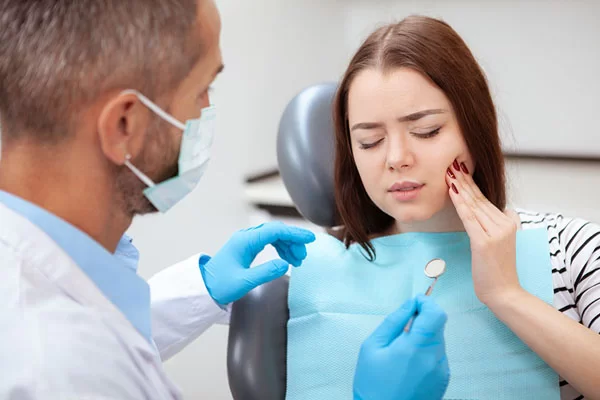Find Relief From Jaw Pain and Improve Your Quality of Life
Living with chronic jaw pain can significantly affect your day-to-day activities, from eating to speaking. If you suspect you’re experiencing symptoms of a temporomandibular joint (TMJ) disorder, specifically internal joint derangement (IJD), seeking timely treatment is essential. Our dentists in Wilmington and Seaford, DE, can diagnose and treat TMJ disorders to help you find lasting relief.
Call us today at(302) 999-7600(Wilmington) or (302) 536-7589(Seaford) to schedule your consultation.
What Is Internal Joint Derangement?
Internal joint derangement (IJD)is a condition affecting the temporomandibular joint (TMJ), where the structures within the joint, such as the articular disc, ligaments, or cartilage, become displaced or damaged. This misalignment can result in jaw pain, limited range of motion, and even jaw locking.
Types of Internal Joint Derangement
There are two types of internal joint derangement:
- Disc Displacement With Reduction: In this condition, the articular disc deviates from its normal position but returns during jaw movement, often resulting in clicking or popping sounds. This type of disc displacement might cause mild discomfort and is commonly associated with temporomandibular joint disorders.
- Disc Displacement Without Reduction: This form involves persistent disc displacement, leading to significant jaw pain, restricted jaw movement, and challenges in speaking or chewing. It’s often linked with temporomandibular joint internal derangement and may require more intensive treatment.
Causes and Risk Factors of Internal Joint Derangement
Internal joint derangement, particularly affecting the temporomandibular joint, can arise from several causes:
- Trauma to the jaw or facial area
- Arthritis or degenerative joint disease
- Misaligned bite or malocclusion
- Chronic teeth grinding (bruxism) or jaw clenching
Certain risk factors, such as stress, poor posture, or a history of temporomandibular joint dysfunction, can increase the likelihood of developing internal derangement.
Symptoms of Internal Joint Derangement
If you’re experiencing the following symptoms, you may have IJD:
- Jaw pain or tenderness
- Joint noises such as clicking or popping
- Difficulty or pain during mouth opening or closing
- Jaw locking in the open or closed position
- Headaches, earaches, or tinnitus
Don’t let these symptoms worsen—schedule a consultation today by calling (302) 999-7600(Wilmington) or (302) 536-7589(Seaford).
How Is Internal Joint Derangement Diagnosed?
Diagnosing temporomandibular joint internal derangement typically involves:
- A review of your medical history and symptoms
- A physical examination of your jaw’s range of motion and joint function
- Imaging tests like magnetic resonance imaging (MRI) or CT scans to evaluate the disc position and identify structural damage
The doctor may also perform a joint aspiration, which involves inserting a needle into the joint to remove and analyze fluid.
Treatments for Internal Joint Derangement
Non-Surgical Treatments
For mild to moderate cases, conservative treatments for IJD can effectively manage symptoms:
- Pain Management: Over-the-counter or prescription medications, and in some cases, corticosteroid injections
- Physical Therapy: Exercises targeting the lateral pterygoid muscle and surrounding tissues to improve jaw function and flexibility
- Lifestyle Modifications: Adopting a soft-food diet, avoiding chewing gum, and reducing stress
Surgical Treatments
Severe cases may require surgical intervention, such as:
- Arthrocentesis to flush out the joint and reduce inflammation
- Open joint surgery to repair or replace damaged structures
- Disc repositioning or removal for advanced disc displacement
Frequently Asked Questions
Yes, untreated IJD can worsen over time, leading to chronic pain, degenerative joint changes, and reduced jaw mobility.
While internal joint derangement primarily affects the temporomandibular joint, it can also cause referred pain in other areas of the head and neck, such as the ears, cheeks, and temples. In some cases, it can also lead to headaches, neck pain, and facial muscle spasms.
Internal joint derangement is a relatively common condition, mostly seen in people between the ages of 20 and 50, and is more frequent in women than men. However, it can affect individuals of all ages, including children. The incidence of internal joint derangement may be increasing due to factors such as stress, poor diet, and lack of physical activity.
Preventing internal joint derangement can be challenging, but some measures can reduce the risk of developing the condition:
- Practicing good posture to reduce strain on the temporomandibular joint
- Avoiding excessive chewing or clenching
- Seeking prompt treatment for jaw injuries or oral facial pain
Find Relief for Internal Joint Derangement Symptoms
Whether you’re experiencing disc displacementwith reduction, jaw locking, or other symptoms of temporomandibular joint dysfunction, our skilled dental team in Wilmington and Seaford, DE, can help.
Call (302) 999-7600(Wilmington) or(302) 536-7589(Seaford) to schedule your appointment today. We proudly serve patients in Wilmington, Seaford, and surrounding Delaware communities.



